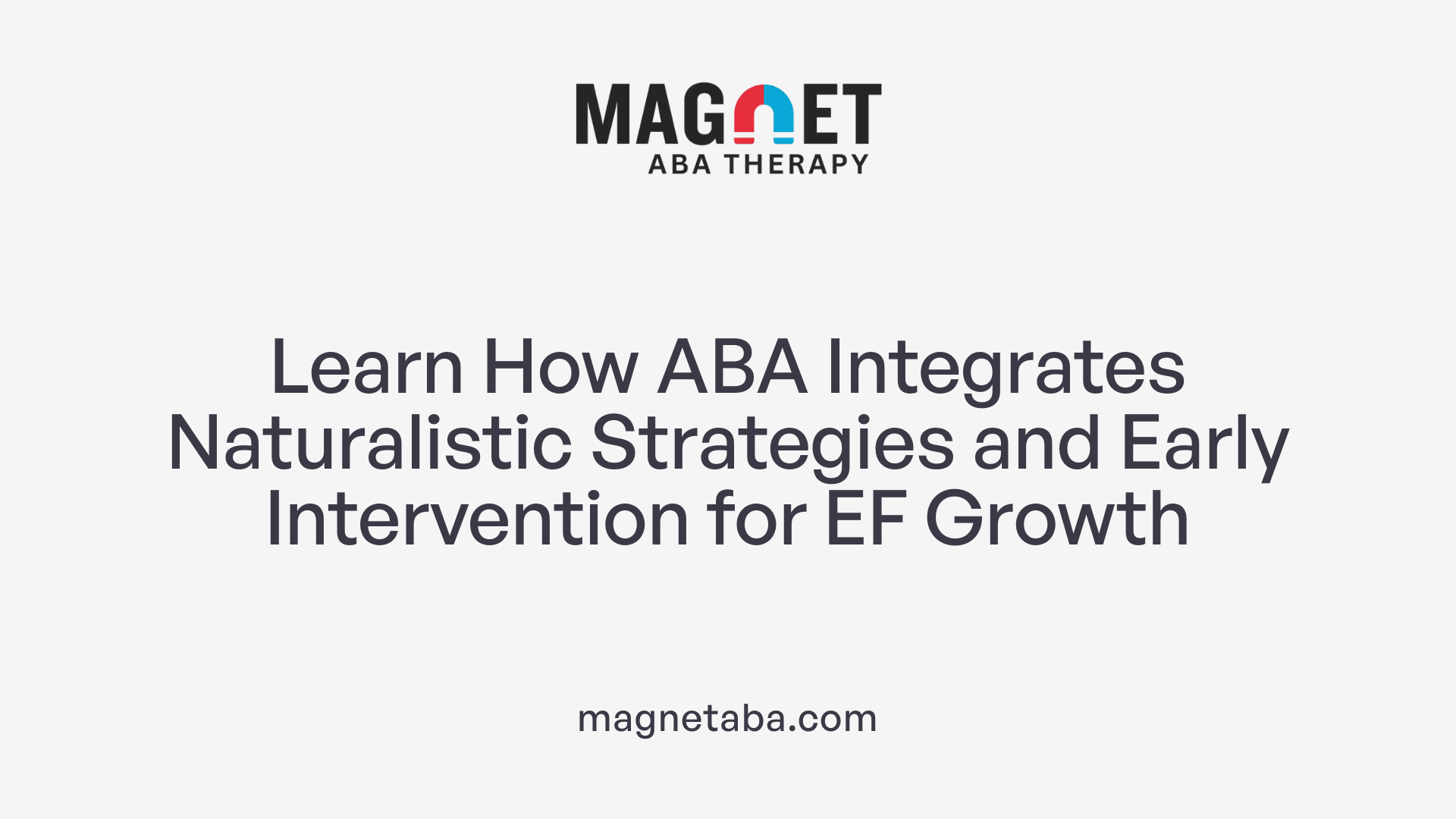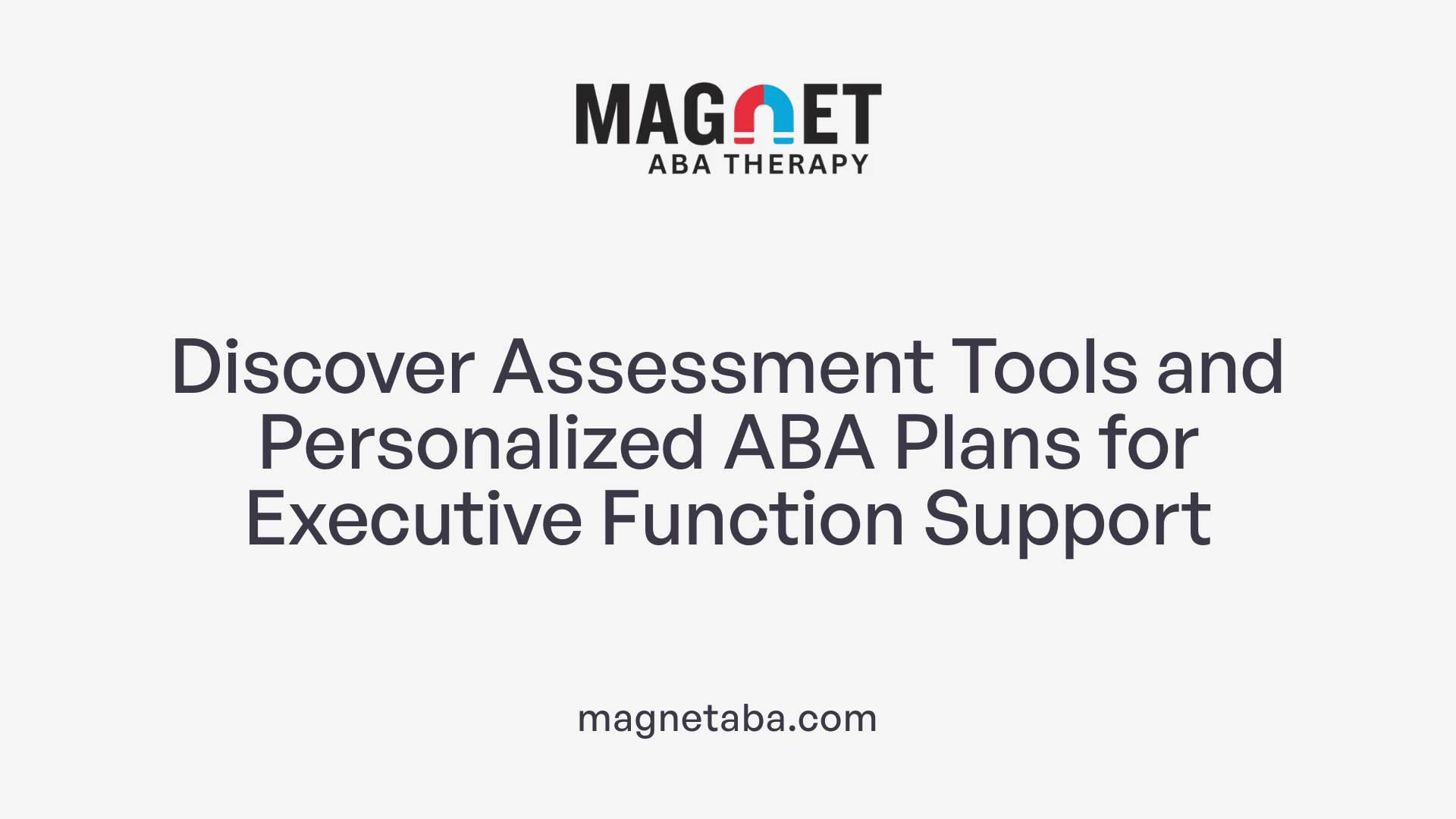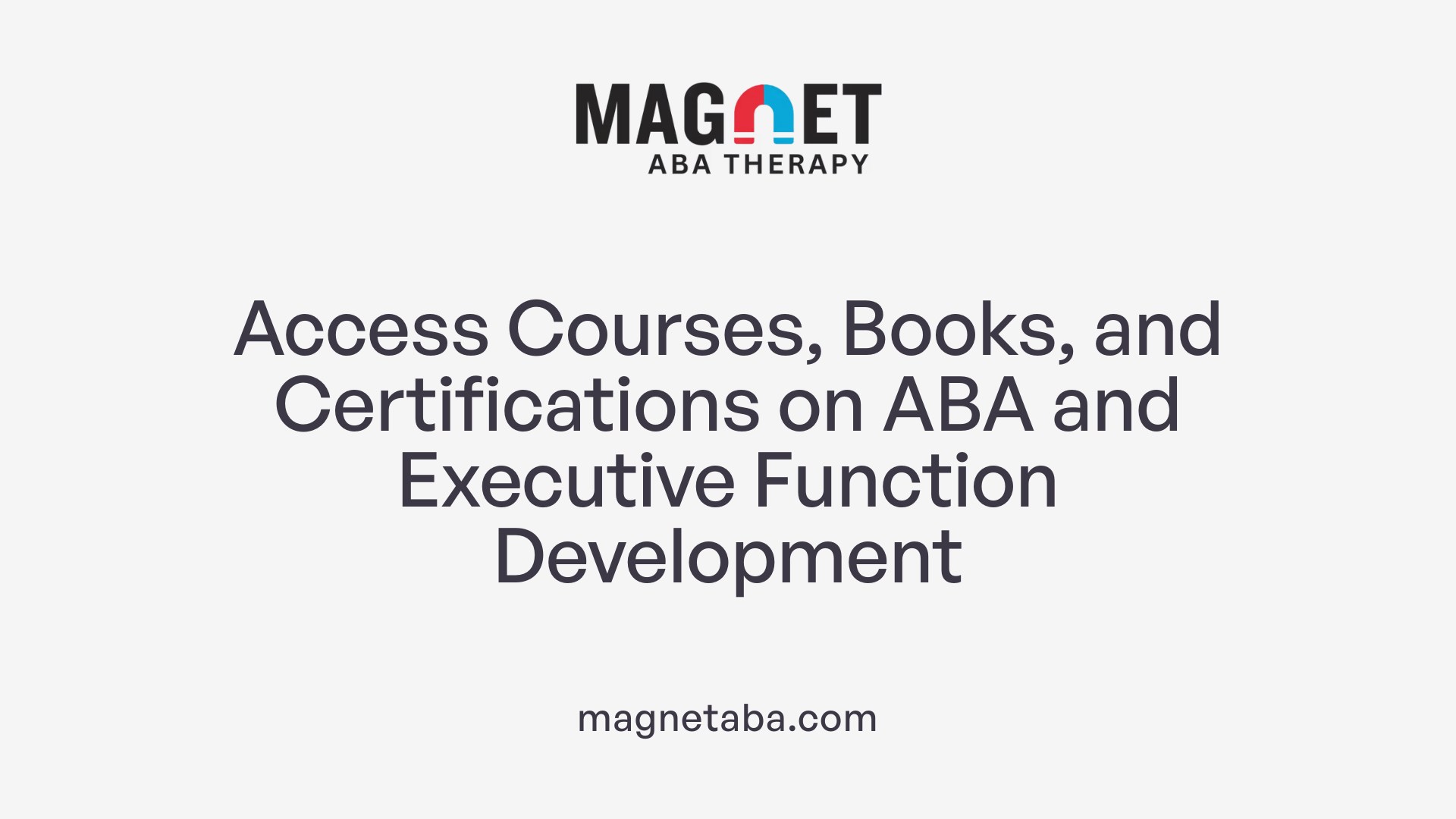Understanding the Power of ABA in Developing Executive Skills
Executive functioning skills—such as planning, impulse control, and cognitive flexibility—are fundamental for children, especially those on the autism spectrum. These skills enable effective management of daily activities, academic tasks, and social interactions. However, many children with autism experience challenges in these domains. Applied Behavior Analysis (ABA) offers a structured, evidence-based approach to nurture and strengthen these vital cognitive processes, leading to increased independence and improved quality of life.
How ABA Supports Executive Functioning Development

How does ABA therapy support the development of executive functioning skills?
Applied Behavior Analysis (ABA) therapy is a structured, evidence-based approach that enhances critical cognitive skills involved in executive functioning. It uses a variety of strategies, including visual supports, task analysis, positive reinforcement, and environmental modifications, to teach and strengthen abilities like working memory, impulse control, cognitive flexibility, and planning.
One central method in ABA is discrete trial training, which breaks down complex tasks into manageable steps and provides clear prompts and reinforcement. This systematic approach allows children to learn specific skills in a controlled and supportive environment.
Early intervention is especially effective because it capitalizes on brain plasticity—the brain's ability to change and adapt—facilitating the acquisition of executive functions across different settings. This supports long-term independence and helps children manage daily tasks, navigate social situations, and perform academically.
In addition to structured teaching, ABA incorporates naturalistic teaching strategies that embed learning into everyday activities. Collaboration with families and educators ensures these skills are generalized beyond therapy sessions to real-world environments.
Overall, ABA’s individualized, goal-oriented interventions help children with autism develop vital executive skills. These skills underpin successful adaptation, emotional regulation, and social participation, leading to improved quality of life.
Strategies and Techniques Employed in ABA to Enhance EF Skills

What strategies and techniques are used in ABA to enhance executive functioning?
Applied Behavior Analysis (ABA) employs various targeted strategies to support and develop executive functioning skills in individuals with autism. One fundamental approach is task analysis, which breaks complex tasks into small, manageable steps. This makes activities less overwhelming and fosters confidence in completing tasks.
Visual supports are widely used within ABA to improve organization and planning. These include checklists, visual schedules, and cue cards, which serve as concrete reminders and help individuals understand expectations and sequences of activities.
Reinforcement plays a vital role in ABA techniques, encouraging desirable behaviors and increasing motivation. Positive reinforcement can be as simple as praise or reward systems aligned with individual preferences to encourage task engagement and emotional regulation.
Prompting strategies, such as physical, verbal, or gestural prompts, assist individuals in executing tasks when they are initially learning new skills or facing challenges. These prompts are gradually faded as independence increases.
Establishing consistent routines and environmental cues—using timers, visual timers, or environmental signals—support flexible thinking and time management. Such cues help individuals anticipate transitions and reduce difficulties associated with change.
Additionally, ABA incorporates modeling behaviors by demonstrating problem-solving and organizational strategies. Self-monitoring techniques and reflection activities encourage individuals to evaluate their own progress and develop self-regulation.
All these strategies are supported by ongoing assessment to customize interventions, ensuring they meet the unique needs of each individual and promote meaningful skill development in executive functioning.
Assessing and Addressing Executive Function Challenges in ABA

How does ABA assess and address challenges in executive functioning?
Applied Behavior Analysis (ABA) employs a comprehensive approach to evaluate and support executive functioning skills in children with autism. Initially, therapists utilize observation to note behaviors related to planning, impulse control, cognitive flexibility, and emotional regulation.
Standardized assessment tools such as the Behavior Rating Inventory of Executive Function (BRIEF) are often used to gather quantitative data. These tools involve caregivers and educators rating behaviors across different settings, providing insights into areas like working memory and task switching.
Alongside standard tests, naturalistic assessments observe children during everyday activities. This involves engaging children in play and routine tasks to identify specific skill gaps and behaviors needing support.
Once assessments highlight challenges, individualized intervention plans are crafted. These plans incorporate engaging, play-based strategies that might include visual supports like checklists, visual schedules, and timers.
Interventions often include structured routines and reinforcement strategies such as social stories, board games, and rhythm activities to promote flexibility, self-control, and organization.
Part of the ABA approach involves collaborating with families and educators to ensure the strategies are consistently implemented across different environments. This consistency enhances skill generalization and stability.
Continuous monitoring is vital. Therapists regularly review progress through ongoing assessment, making adjustments to the intervention strategies as needed. This iterative process helps sustain and reinforce gains in executive functioning.
In summary, ABA assesses executive functioning through a variety of methods and tailors interventions to individual needs, combining evidence-based practices with ongoing evaluation to support children's development in managing everyday tasks.
Empowering Caregivers and Educators Through ABA Techniques
How can caregivers and parents utilize ABA approaches to support and enhance executive skills at home?
Caregivers and parents play a crucial role in fostering executive functioning skills through ABA principles at home. They can start by establishing structured routines and visual supports like visual schedules and checklists. These tools help children understand daily expectations, reducing anxiety and promoting independence.
Breaking tasks into smaller, manageable steps is vital. For instance, simplifying chores or homework into stages makes them less overwhelming, boosting confidence and encouraging task initiation. Using timers or visual cues can also assist children in managing their time effectively.
Engaging children in play-based activities is another effective strategy. Tasks like obstacle courses or treasure hunts not only make learning fun but also strengthen cognitive flexibility and problem-solving skills. Such activities encourage children to think adaptively and respond to changes in their environment.
Positive reinforcement remains a core element. Consistently rewarding desired behaviors with praise or tangible rewards increases motivation and self-control. Natural reinforcers, such as praising effort or offering privileges, support emotional regulation and persistence.
Collaboration with trained professionals, such as behavior analysts or occupational therapists, enhances these efforts. Data collection and regular monitoring help customize interventions, ensuring they meet the child's unique executive functioning needs. This collaboration also promotes consistency across home and other settings.
Implementing these evidence-based strategies at home creates an environment that supports the development of essential skills like organization, memory, flexibility, and self-control, ultimately fostering greater independence and improved daily functioning.
Educational Resources and Professional Development Opportunities
 Understanding the connection between applied behavior analysis (ABA) and executive functioning (EF) is crucial, and there are numerous educational resources available for professionals, educators, and parents alike. These tools and learning opportunities aim to deepen knowledge, enhance skills, and improve intervention outcomes.
Understanding the connection between applied behavior analysis (ABA) and executive functioning (EF) is crucial, and there are numerous educational resources available for professionals, educators, and parents alike. These tools and learning opportunities aim to deepen knowledge, enhance skills, and improve intervention outcomes.
One of the most accessible options is online courses and webinars. For instance, programs offered by institutions like the Florida Institute of Technology provide continuing education units (CEUs) that incorporate evidence-based strategies, real-life case examples, and interactive modules. Such courses focus on translating ABA techniques to target specific EF skills like task initiation, working memory, and emotional regulation.
Books and research articles also serve as valuable resources. Works authored by experts such as Dr. Jaime Flowers detail strategies for supporting executive functions in children with autism through ABA methods. Research studies, including recent publications like Ko et al. (2024), explore innovative approaches and the effectiveness of interventions targeting EF. These scholarly materials provide in-depth understanding and practical guidance.
Assessment tools are fundamental in identifying specific EF deficits. Instruments like the Behavior Rating Inventory of Executive Function, Second Edition (BRIEF-2), along with naturalistic observation techniques, help professionals and caregivers pinpoint individual needs. This information guides tailored intervention plans that incorporate visual supports, structured routines, and play-based activities designed to strengthen EF skills.
Training programs and professional certifications are also offered by various organizations. These programs offer specialized training in ABA strategies for EF development, equipping practitioners with practical skills to implement within educational and home settings. Many of these certifications emphasize a multidisciplinary approach, integrating behavioral, occupational, and speech therapies.
For ongoing learning, webinars and virtual conferences provide current updates and interventions in a convenient format. These events often feature top clinicians and researchers sharing evidence-based practices, success stories, and innovative tools for integrating ABA with EF support.
In sum, a broad spectrum of online courses, authoritative literature, assessment measures, and professional certification programs are available. They collectively serve to improve understanding of how ABA strategizes the development of executive functioning, ultimately benefiting children with autism by fostering independence, social skills, and academic success.
More Information Search Query: Educational resources linking ABA and executive functioning
The Critical Role of Executive Functioning in Autism Support Strategies

Why are executive functioning skills important in children with autism, and how can ABA assist in their development?
Executive functioning skills are essential for children with autism because they support independence, academic success, and daily life management. These cognitive abilities include working memory, cognitive flexibility, impulse control, emotional regulation, and task initiation. Many children with autism experience delays or difficulties in these areas, which can make adapting to new situations, completing tasks, and managing behaviors challenging.
Improving executive functions early on is vital. Applied Behavior Analysis (ABA) offers proven strategies grounded in research to help develop these skills. ABA programs utilize visual supports such as calendars and checklists, structured routines, and social stories to promote better understanding and predictability. These techniques help children learn to regulate their emotions, control impulses, and switch between tasks efficiently.
Assessment tools like the BRIEF-2 enable behavior analysts to identify each child's specific needs, guiding the creation of personalized goals. Family involvement is encouraged to reinforce learning at home and in community settings. Through consistent, goal-oriented interventions, ABA supports the development of fundamental executive skills, enhancing children’s independence and overall well-being.
In summary, fostering executive functioning through ABA techniques is a critical component in improving the quality of life for children with autism, helping them to navigate daily challenges with greater confidence and success.
Fostering Growth, Independence, and Well-Being
Incorporating ABA techniques to develop executive functioning skills is a powerful strategy in supporting children with autism. These evidence-based methods, from visual supports to systematic assessments, equip children with the cognitive tools necessary for greater independence, academic success, and social participation. Parental involvement, ongoing assessment, and professional collaboration ensure that interventions remain tailored and effective across different environments. As research and practice continue to evolve, the integration of ABA and executive functioning development holds promise for enhancing the lives of children and families facing the challenges of autism.
References
- Strategies to Support Autism Executive Function - Blossom ABA
- How Therapy Helps Build Executive Functioning Skills in Children
- Assessment and Intervention of Executive Functioning Skills with ...
- How Autism Affects Executive Function and Daily Living - All Star ABA
- Practical Interventions | Learning BCBA CEU Credits: 6
- Improving Executive Functioning Skills for Kids is Often a Top ...
- Teaching Executive Function Skills: A Comprehensive Guide For ...











